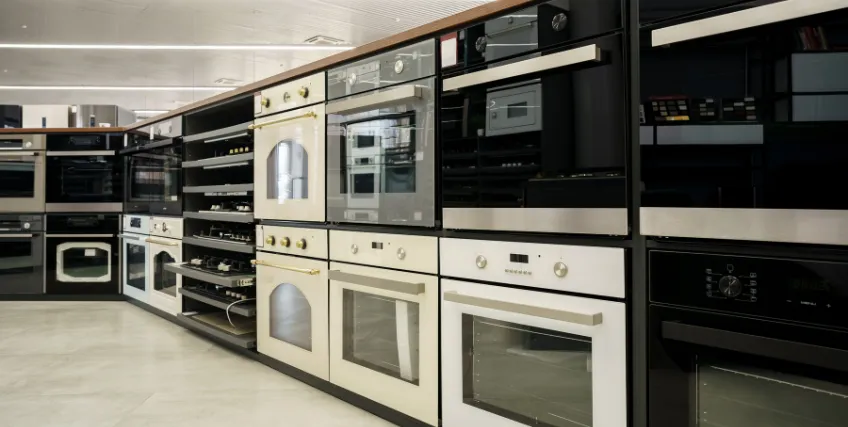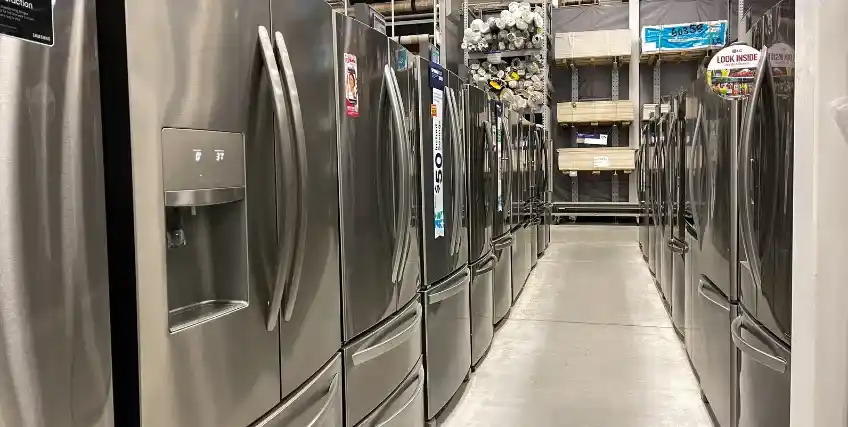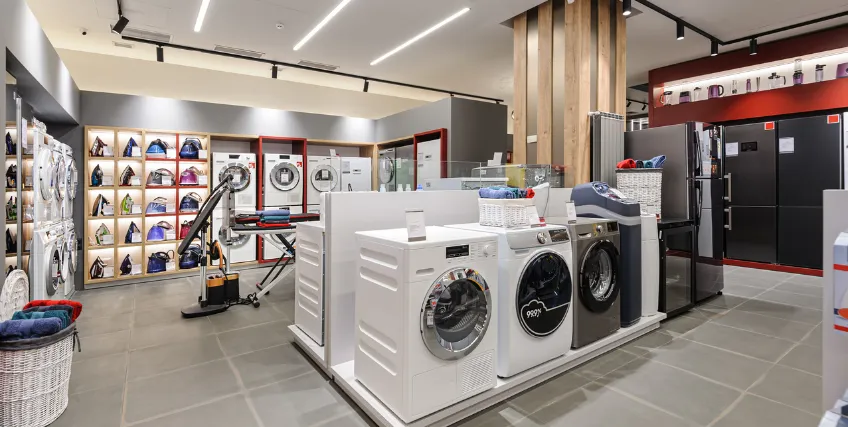How to Get a Small Business Loan for Your Appliance Store
Sep 25, 2025 | Last Updated on: Sep 29, 2025

Most small business owners have to navigate a constant struggle of balancing revenues and costs, but that can be particularly challenging for an appliance store owner. Dealing with high-ticket items like refrigerators, washers, and ovens requires significant upfront expense, which can strain your cash flow, all while trying to deliver the best customer experience possible in a competitive market. Appliance store business owners often need a steady stream of capital to keep the business running smoothly.
Securing appliance store business loans can be an effective way to address your capital needs. However, the small business loan process can feel overwhelming. Here, we’ll walk you through everything you need to know about getting appliance store funding so you can feel confident about appliance store business loans for your business.
In this article:
- Understand how to leverage various funding options for appliance shops.
- Learn the types of appliance store business loans available to you.
- Discover how to improve your credit approval chances.
Why Your Appliance Store Needs Strategic Financing
There are several key reasons why retailers might consider business financing. Some of the most important include:
- Inventory: The biggest reason to consider appliance store business loans is the amount of capital tied up in inventory. A single high-end refrigerator can cost thousands of dollars, and you need to stock your showroom with a variety of models. Moreover, the appliance market can be very seasonal, so financing can help you purchase inventory in bulk at a discount and manage cash flow during slower periods.
- Showroom upgrades: From upgrading displays to installing new point-of-sale (POS) systems, or doing a full-scale renovation, appliance store business loans can help you address some of your biggest business needs.
- Delivery and service fleets: Appliance store funding can help you upgrade or acquire a fleet of trucks for delivery and installation.
- Expansion: If you’re ready to open a second location, you need significant business funding. Appliance store business loans can help cover everything from the initial lease and build-out to the inventory and hiring.
Types of Appliance Store Business Loans
The key to successful financing is choosing the option that best fits your specific needs. These are some of the most common types of appliance store business loans available.
Term loans
Conventional term loans can be long-term or short-term. These loans offer a lump sum upfront that you can use to address a variety of business needs that you must repay with monthly payments based on an interest rate and loan terms. Short-term loans are often referred to as working capital loans because they provide a quick lump sum of cash that is repaid over a short period and can help address working capital needs.
Both traditional lenders, like banks and credit unions, and online lenders offer term loans. Traditional lenders tend to have stricter eligibility requirements and longer application timelines, but can offer higher loan amounts and lower interest rates. Online lenders are good options if you have bad credit, are a new business, or are looking for fast funding appliance store business loan options.
SBA loans
The U.S. Small Business Administration partially guarantees SBA loans, making them less risky for lenders. That allows lenders to offer more favorable terms, including lower interest rates, longer repayment periods, and smaller down payments for qualified applicants.
The two most common types are the SBA 7(a) loan, which can be used for a wide variety of purposes, from working capital to equipment, and the SBA 504 loan, which is specifically for commercial real estate or large equipment.
SBA loans offer industry-leading annual percentage rates (APRs), long repayment terms, and flexibility in how you use the funds. However, the application process tends to be long and rigorous, requiring extensive documentation and a strong business plan. Borrowers will need to have good credit and an excellent business plan, which makes it a more difficult financing option to obtain.
Equipment financing
Equipment financing is a specialized loan used to purchase or lease business-specific equipment. For an appliance store, this could mean delivery trucks, forklifts for the warehouse, or new display models.
Equipment loans are secured by the equipment itself, meaning that if you default on the loan, the lender can repossess the equipment to cover their losses. However, this collateral also makes banks more willing to work with newer businesses or those with less-than-perfect credit.
Equipment loans are useful appliance store business loans if you need essential equipment to do business, but less so if you have many business needs to address.
Business lines of credit
A business line of credit is similar to a credit card and a loan, but distinct from both. You’re approved for a maximum amount, and you can draw from it as needed. You only pay interest on the amount you borrow. As you repay, the funds become available again.
Business lines of credit are generally easier to qualify for than business loans and are much more flexible. If approved, you can draw and repay funds as many times as you need, as long as you don't exceed your credit limit. That makes it one of the most flexible appliance store business loans available, allowing you to manage ongoing, unpredictable needs like bridging cash flow gaps, covering unexpected repairs, or taking advantage of a last-minute opportunity to buy discounted inventory.
While lines of credit are very flexible, they often have higher interest rates than a traditional term loan.
Tips to Qualify for Appliance Store Business Loans
Before you can secure any kind of appliance store business loans, you need to understand what lenders are looking for. While every lender has different eligibility criteria and weighs applications in different ways, these are the most common factors that weigh into a credit approval decision:
- Credit score: Lenders will look at your personal and business credit scores if you have one. A better credit history will not only increase your likelihood of approval, but it can also make you eligible for better rates and loan terms.
- Financial statements: Any appliance store business loan application requires clean, organized, and up-to-date financial records. This includes profit & loss statements, balance sheets, cash flow statements, business bank statements, and tax returns.
- Business plan: A well-crafted business plan demonstrates that you know what you’re doing. It should outline your goals, your market analysis, and provide a detailed explanation of how you plan to use the funds to generate revenue and repay the debt.
- Collateral: Not all loans require collateral, but securing a loan may help you get lower interest rates or better terms. Some loans, such as real estate, equipment, or even inventory loans, often require collateral or use the purchased asset itself as collateral.
- Time in business and revenue: Most lenders prefer to see that a business has been operating successfully for at least two years. They also look for consistent, predictable revenue. Online lenders may be more willing to work with startups, but a track record of sales and profitability can only help your application.
How to Build a Strong Appliance Store Business Loan Application
To secure the best appliance store business loan for your business, you need to do more than just meet the basic requirements. Here are some tips to make your application stand out:
- Get organized: Create a physical or digital folder with all your documents ready to go. This includes your business plan, financial statements, tax returns, bank statements, and any legal documents (like your business license and articles of incorporation). Being prepared and able to find documents quickly shows professionalism and can help expedite the process.
- Know your numbers: You should be able to speak confidently about your business’s financials. If a lender asks about a dip in revenue in your recent history, you should be ready to explain why, whether it’s due to a one-time major expense, a seasonal change, or a financial emergency.
- Compare offers: Don’t just accept the first offer you receive. Compare interest rates, repayment terms, and fees from different lenders—including traditional banks, credit unions, and online lenders.
- Work on your credit: Before applying, check your personal and business credit reports for any errors. Removing errors could help your credit, while paying down outstanding debts to improve your credit utilization ratio can also help improve your score.
Final Thoughts
Strategic funding can make a major difference for any appliance store owner. Whether you need to invest in new inventory, upgrade your showroom, or plan for expansion, the right appliance store business loans can provide the capital you need for sustainable growth. Before applying, make sure you understand your options, shop lender offers, and take the time to prepare the strongest application possible. Remember, a lender who understands your industry can be more than just a financial partner; they can be a business mentor, too.
FAQs About Appliance Store Business Loans
What's the fastest way to get a loan for my appliance store?
Online lenders tend to have faster funding times than traditional lenders. Likewise, loan options like working capital loans or business lines of credit may have a more streamlined application process and funding times.
Can I get a loan if my business is new?
Startups may struggle to qualify for traditional bank or SBA loans. However, they may be eligible for working capital loans, lines of credit, or secured equipment financing. Online lenders tend to be more willing to work with new businesses than traditional lenders.
How much can I borrow for my appliance store?
The amount you can borrow depends on several factors, including your revenue, time in business, credit score, and the type of loan you choose. Lenders will assess your ability to repay the loan based on your business’s financial health.
Do I need to provide collateral for a loan?
It depends on the loan type. Unsecured loans, like some working capital loans, do not require collateral. However, secured loans that use collateral (like equipment or real estate) are often the best choice for a lower interest rate and a larger loan amount.
What's the main difference between an SBA loan and a bank loan?
An SBA loan is a bank loan that the government partially guarantees. This guarantee reduces the lender's risk, allowing them to offer better terms (lower rates, longer terms, and less stringent requirements) than they would for a standard, non-SBA-backed loan. Regular bank loans are not backed by the SBA.
Frequent searches leading to this page
Related Articles
Appliance Store Business Loans: Financing Options to Stock Inventory and Grow Your Retail Business
October 7, 2025
Understanding Interest Rates and Terms in Appliance Financing Options
September 29, 2025
How to Get a Small Business Loan for Your Appliance Store
September 29, 2025
Term Loans are made by Itria Ventures LLC or Cross River Bank, Member FDIC. This is not a deposit product. California residents: Itria Ventures LLC is licensed by the Department of Financial Protection and Innovation. Loans are made or arranged pursuant to California Financing Law License # 60DBO-35839




